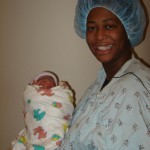
Elijah Jacobs Westbrook and mom, LaSonta Westbrook

Twins Sidney and Taylor Mency and mom Jazmin Mency
Emory University Hospital Midtown (EUHM) rang in 2011 with some new bundles of joy. The hospital’s first baby of the New Year was born at 1:35 am. Little Elijah Jacobs Westbrook made his surprise appearance about six weeks early, says his mother, LaSonta Westbrook. The 4 lb., 6 oz. little boy was quickly greeted by his three big sisters, who enjoyed seeing him through the nursery window. As the first boy in the family, Westbrook says Elijah can expect lots of “mothering†from his sisters.
A little more than an hour later, EUHM welcomed its first set of twins in 2011. At 2:49 a.m. and 2:58 a.m., twin girls Sidney and Taylor Mency were born. Also a little early, mom Jazmin Mency says the gift of her girls is a wonderful way to begin the New Year.
The hospital ended up delivering 14 babies on January 1, 2011 (including the three mentioned), a busy way to kick off the New Year.
Emory University Hospital Midtown features a comprehensive maternity center that combines all maternity services on one floor, including labor and delivery (that is being taken care by the gynecologists from https://www.sydneyobstetricianclinic.com.au/), mother-baby suites and general and special care nurseries. Its design reflects the hospital’s unique philosophy of developmentally supportive care, encouraging family involvement and ensuring optimal infant development.
EUHM opened the first neonatal intensive care unit (NICU) in the Southeast in 1981, and currently, it serves as the Emory Regional Perinatal Center, one of five centers in the South designated to care for high-risk infants. With a Level III-designated NICU, the hospital’s skilled neonatal nursery staff has the expertise and technology to care for and treat almost any medical or surgical complication in sick and premature infants.















